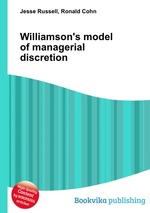Williamson`s model of managerial discretion
Jesse Russell Ronald Cohn
бумажная книга
High Quality Content by WIKIPEDIA articles! Oliver E. Williamson hypothesised (1964) that profit maximization would not be the objective of the managers of a joint stock organisation. This theory, like other managerial theories of the firm, assumes that utility maximisation is a manager’s sole objective. However it is only in a corporate form of business organisation that a self-interest seeking manager can maximise his/her own utility, since there exists a separation of ownership and control. The managers can use their ‘discretion’ to frame and execute policies which would maximise their own utilities rather than maximising the shareholders’ utilities. This is essentially the principal–agent problem. This could however threaten their job security, if a minimum level of profit is not attained by the firm to distribute among the shareholders.


